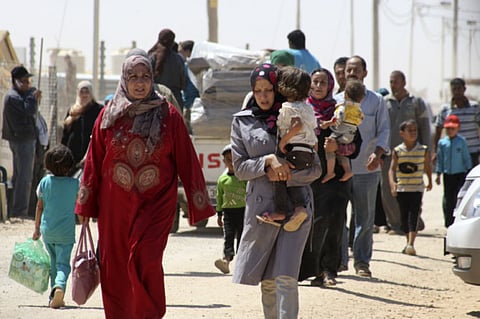Protesting refugees face deportation
Riots over poor living conditions break out at Jordanian border camp

Amman: Some 150 Syrian refugees are facing possible deportation after violent riots over poor living conditions broke out at a Jordanian border camp late Tuesday night.
Twenty-eight police officers were injured, one seriously, after stone throwing refugees rampaged through the Al Zaatari camp in the north of the country, six miles from the Syrian border.
“We will be firm in the face of those who break the law and will send home people arrested for attacking police officers,” Jordanian Prime Minister Fayez Tarawneh told state television after visiting injured police in hospital in Amman.
Many say conditions in the desert tent city, which is now home to 21,000 refugees after a mass influx in recent days, are unbearable, citing constant dust storms, scorching desert temperatures and a shortage of everything but the very bare essentials.
It’s the second case of rioting at the camp in under a week where tensions are running high between refugees and local police officers.
On a recent visit to the camp one refugee showed injuries sustained in clashes with police while others involved in the violence said they just wanted to go home:
“As soon as people arrived here and they saw what it was like they asked to go back to Syria... it’s hell there at the moment but here... it’s just as bad.” Wandering through the camps it becomes clear that conditions are indeed verging on the unbearable. Most of those flooding over the border come with little other than the clothes on their backs and the UNHCR, along with the Jordan Hashemite Charity Organisation, is struggling to meet the needs of the new arrivals.
On the ground, families are packed into cramped tents where temperatures inside exceed those under the direct blazing desert sun. Dirty children run shoeless on the scorching sand and with little to do, play with all they can find, namely polystyrene strips and empty plastic bottles.
A second children’s playground is currently being built but with refugees arriving in their thousands every night, improvements are taking second place to accommodating new arrivals.
Advances in the availability of running water and electricity have been made, evident in the bundle of taps where young girls play in puddles of water while their mothers wash what little clothes they possess. One Syrian grandmother who fled with her 15 offspring at the end of last week however says they desperately need aid. “We haven’t received anything. We haven’t been given any clothes and we came with nothing. We desperately need a change of clothes for the girls, we also need lamps. We are sleeping in complete darkness.”
Others say they have been forced to sleep outdoors having failed to find shelter. “We came here to protect our children. I was given tent numbers when I arrived... but I can’t find them... I’ve been here four days now and I don’t have a tent, the numbers they gave me don’t seem to exist.”
Jordan, buckling under the pressure on its already limited resources, has appealed for humanitarian assistance from the international community.
Ali Bibi, liaison officer for the UNHCR in Jordan, while thanking Gulf countries for their help said “we definitely require more since we have a daily influx of Syrians coming into Jordan at the moment.”
On Monday, the Jordanian government’s Ministry of Planning and International Cooperation alongside the UN launched a $429 million (Dh1.5 billion) aid appeal to extend health, and basic services to the refugees. The UAE, Saudi Arabia and Oman are leading the way for Gulf countries in terms of humanitarian initiatives with the UAE recently opening a 500 bed field hospital near the Syrian border and announcing its intention to fund a second camp near the Jordanian city of Mafraq to ease the pressure on Zaatari.
While improving conditions at Zaatari is a priority for the Jordanian government and the UNHCR recognises that conditions are difficult, Ali Bibi reiterated that violence is not the solution and that all refugees seeking assistance must abide by the laws of the country. “One of the principles of international law for any refugee and the hosting country is the rule of law. The refugees have to accept and respect the countries they are hosted in... the rule of law is the ultimate in security and stability.”
Jordan says work is under way to equip the camp with prefab housing before the desert summer heat turns to biting winter winds but many Syrians hope to return home before a new season dawns. With an unprecedented number of refugees continuing to flee the unabating violence at home, how many seasons will be witnessed before stability returns is a question no one can currently answer.
Unicef predicts 70,000 people will be living in Al Zaatari by the end of the year.
Sign up for the Daily Briefing
Get the latest news and updates straight to your inbox



